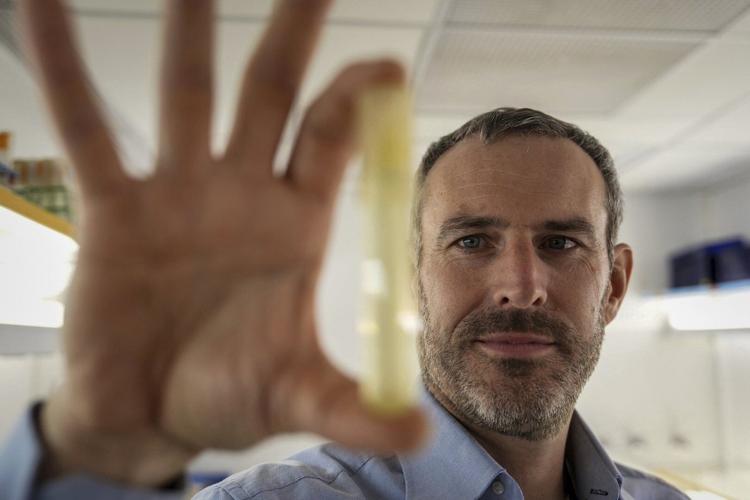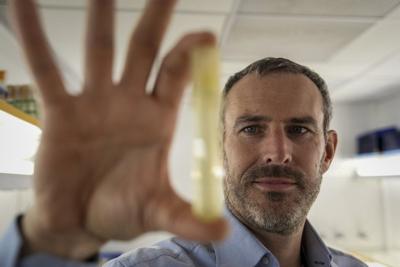SEATTLE (AP) ŌĆö For decades, scientists believed Prochlorococcus, the smallest and most abundant phytoplankton on Earth, would thrive in a warmer world. But new research suggests the microscopic bacterium, which forms the foundation of the marine food web and helps regulate the planetŌĆÖs climate, will decline sharply as seas heat up.
in the journal Nature Microbiology found Prochlorococcus populations could shrink by as much as half in tropical oceans over the next 75 years if surface waters exceed about 82 degrees Fahrenheit (27.8 Celsius). Many tropical and subtropical and are projected to regularly surpass 86 degrees Fahrenheit (30 Celsius) over that same period.
ŌĆ£These are keystone species ŌĆö very important ones,ŌĆØ said Fran├¦ois Ribalet, a research associate professor at the University of WashingtonŌĆÖs School of Oceanography and the studyŌĆÖs lead author. ŌĆ£And when a keystone species decreases in abundance, it always has consequences on ecology and biodiversity. The food web is going to change.ŌĆØ
These tiny organisms hold a vital role in ocean life
Prochlorococcus inhabit up to 75% of EarthŌĆÖs sunlit surface waters and produce about one-fifth of the planetŌĆÖs oxygen through photosynthesis. More crucially, Ribalet said, they convert sunlight and carbon dioxide into food at the base of the marine ecosystem.
ŌĆ£In the tropical ocean, nearly half of the food is produced by Prochlorococcus,ŌĆØ he said. ŌĆ£Hundreds of species rely on these guys.ŌĆØ
Though other forms of phytoplankton may move in and help compensate for the loss of oxygen and food, Ribalet cautioned they are not perfect substitutes. ŌĆ£Evolution has made this very specific interaction,ŌĆØ he said. ŌĆ£Obviously, this is going to have an impact on this very unique system that has been established.ŌĆØ
The findings challenge decades of assumptions that Prochlorococcus would thrive as waters warmed. Those predictions, however, were based on limited data from lab cultures. For this study, Ribalet and his team tested water samples while traversing the Pacific over the course of a decade.
Over 100 research cruises ŌĆö the equivalent of six trips around the globe ŌĆö they counted some 800 billion individual cells taken from samples at every kilometer. In his lab at the University of Washington, Ribalet demonstrated the SeaFlow, a box filled with tubes, wires and a piercing blue laser. The custom-built device continuously pulls in seawater, which allowed the team to count the microbes in real time. ŌĆ£We have counted more Prochlorococcus than there are stars in the Milky Way,ŌĆØ Ribalet said.
Experts warn of ŌĆśbig consequencesŌĆÖ
Paul Berube, a research scientist at Massachusetts Institute of Technology who studies Prochlorococcus but was not involved in the work, said the breadth of data is ŌĆ£groundbreaking.ŌĆØ And he said the results fit with what is known about the microbeŌĆÖs streamlined genome, which makes it less adaptable to rapid environmental changes.
ŌĆ£TheyŌĆÖre at the very base of the food web, and they feed everything else ŌĆö the fish eat the things that eat the phytoplankton and we eat the fish,ŌĆØ he said. ŌĆ£When changes are being made to the planet that influence these particular organisms that are essentially feeding us, thatŌĆÖs going to have big consequences.ŌĆØ
To test whether Prochlorococcus might evolve to withstand hotter conditions, RibaletŌĆÖs team modeled a hypothetical heat-tolerant strain but found that even those would ŌĆ£not be enough to fully resist the warmest temperature if greenhouse emissions keep rising,ŌĆØ Ribalet said.
He stressed that the studyŌĆÖs projections are conservative and donŌĆÖt account for the impacts of plastic pollution or other ecological stressors. ŌĆ£We actually tried to put forth the best-case scenario,ŌĆØ Ribalet said. ŌĆ£In reality, things may be worse.ŌĆØ
Steven Biller, an associate professor at Wellesley College, said the projected declines are ŌĆ£scary but plausible.ŌĆØ He noted Prochlorococcus form part of the ŌĆ£invisible forestsŌĆØ of the ocean ŌĆö tiny organisms most people never think about, but are essential to human survival.
ŌĆ£Half of all photosynthesis is happening in the oceans and Prochlorococcus is a really important part of that,ŌĆØ Biller said. ŌĆ£The magnitude of the potential impact is kind of striking.ŌĆØ
Biller, Berube and Ribalet said that while other microbes may compensate somewhat, the broader risks to biodiversity and fisheries are real.
ŌĆ£We know what drives global warming. There is no debate among the scientific community,ŌĆØ Ribalet said. ŌĆ£We need to curb greenhouse gas emissions.ŌĆØ
He hopes the findings bring more attention to tropical oceans, which could serve as natural laboratories for warming adaptations and as early warning signals for ecological collapse.
ŌĆ£For the first time, I want to be wrong. I would love to be wrong,ŌĆØ he said. ŌĆ£But these are data-driven results.ŌĆØ
___
Follow Annika Hammerschlag on Instagram
___
The Associated Press receives support from the Walton Family Foundation for coverage of water and environmental policy. The AP is solely responsible for all content. For all of APŌĆÖs environmental coverage, visit






























